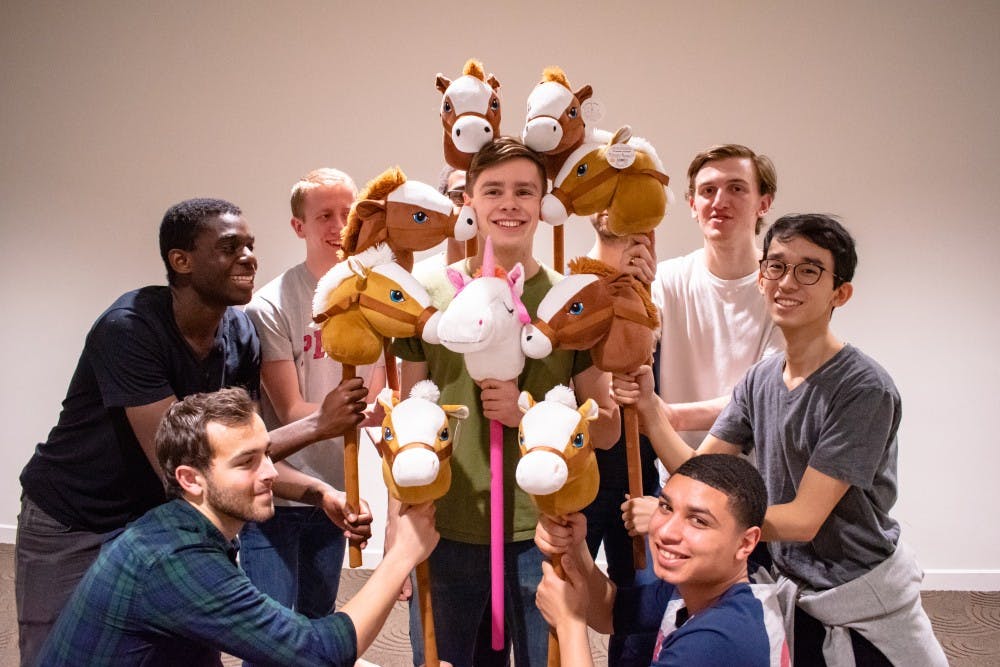Sam Orlin (C’ 19) appears around the corner of the Annenberg Center entrance. He’s in an olive green t–shirt and a black–and–white flannel. During quick introductions, another beaming face turns around the corner, sitting down with a bright pink shirt and flannel, Jimmy Paolini (E’ 19). And then the third, Ryan Young (C’ 19). They’re all in costume—Sam prepared to play Bison Ben, Jimmy as Bill Williams, and Ryan as Flint Westwood—ready for their opening night of The Good, The Bad, and the Uglee.
Sam smiles with an easy charm that is approachable and engaging. It’s of a similar hue to his character, Bison Ben—without the blissful ditziness. His responses use the cadence of a seasoned performer, accustomed to quick and smart responses. He tells me that, “this group functions only by being greater than the sum of its parts.”
The other two nod. They tend to answer questions in the same unison they will achieve on stage in a few hours, substantiating each other’s claims in a collaborative effort. When I ask Ryan about his favorite part of the show, he answers “I’m Not a Loser,” which is Sam's solo.
His lips raise to a smile in company with a slightly furrowed brow; he maintains a poised demeanor as he adds, “it transcends bounds; they surprise me all the time.” The other two laugh, as if this could be construed as a backhanded slight, when what is most clear to me about this group is their care, commitment, and belief in each other.

Images courtesy of Penn Glee Club
My extent of “glee” knowledge ends at the TV series. When I enter the theatre for the performance, I’m expecting applause after sets and, possibly, Don’t Stop Believin.’ Yet, what I am met with instead is unapologetic laughter. At one point, during Bill Williams saying, “let’s man up and talk about our feelings and aspirations like all men do,” I catch myself covering my mouth to stifle laughter, realizing the ridiculousness of such a gesture, as the crowd around me erupts.
Before the song, Ryan had shared that “every audience is different,” describing some as “raucous.” At first, I had thought such a description to be strange, but now I understand what he means. He then added, “we are here to make people happy.” Sam interjects, "you know, to have glee." Jimmy jumps in, adding that his favorite piece is “For Good” from Wicked, using the piece’s own lyrics to describe his reasoning: “because of you, I have been changed for good," referencing the ways performing with the members have positively changed his college experience.
Jimmy delivers a radiant solo. In addition to the show’s comic endeavors, this piece extends the themes of friendship and community. Putting it lightly, the choral range is touching for the audience members, and the Glee club members singing towards each other, communicates this even further.

Images courtesy of Penn Glee Club
As the show comes to a close, the director invites up past Glee members and family. The stage becomes quickly populated with three rows of people covering the from stage right to left, singing their traditional song as if it had been rehearsed before the show’s start. Repeatedly in the interviews, the members share that Glee is a wonderful family. Ryan remarks to “not lose sight of the gift this is” and “cherish time you get to be a part of the group.” It’s in that word, ‘get,’ that I can see that Ryan views being a part of this group as a gift and opportunity. His genuine passion is refreshing.
The performance begins with the theme of friendship and ends with it as well; after searching for the treasure, the three arrive upon an empty box, in which the upbeat Bison Ben smiles and says “maybe the true treasure is friendship.” It’s a line we have always heard, and perhaps even held as true. However, as I stare upon the rows of community on stage, the constant on–stage support, I realize Bison Ben is referring to more than just the trio on stage—he's referring to the entire Glee family, a group that truly becomes great through the sum of its parts.







